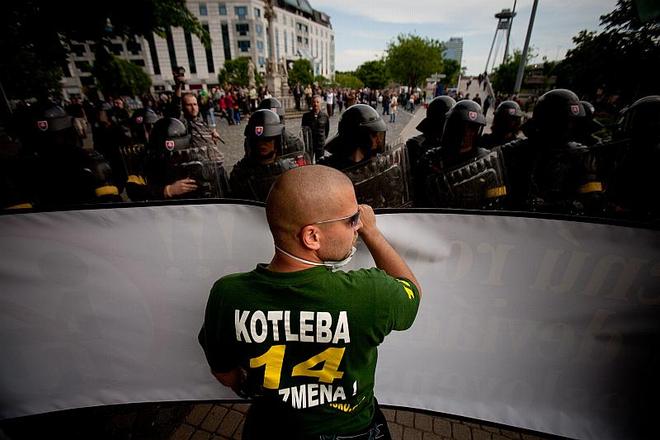MARIJA Cornelissen, a Dutch Member of the European Parliament for the Green Party, was on the stage at Saturday’s Gay Pride rally in Bratislava when a stone thrown by an onlooker narrowly missed her colleague, Ulrike Lunacek.
The Slovak Spectator (TSS): In what capacity were you attending the rally?
Marija Cornelissen (MC): I was there as a member of the European Parliament. Ulrike and I are members of the parliament’s LGBT rights intergroup, and we try to divide the gay prides between us, especially the threatened ones, so that everywhere there’s someone on hand to show support.
TSS: What is it about Gay Pride events in eastern Europe that makes them threatened?
MC: It has to do with conservative societies. In many of these countries religion plays a role, in that it’s worse if the population is more religious.
TSS: Have you had similar experiences to what happened in Bratislava elsewhere?
MC: Something similar happened on a slightly larger scale in Vilnius (on May 8), with the tear gas and the police separating Pride and counter-protesters. In Moldova the Pride march didn’t even happen, because the mayor got the courts to ban it.
TSS: You were on stage in Bratislava when the rock was thrown at Ulrike Lunacek. Were you scared?
MC: I was standing right next to her. She ducked and it missed her by a few centimetres. But to tell you the truth, it was a small stone, and at worst Ulrike might have had a cut over her eyebrow. What threw me more was the tear gas. There were children in the audience when the tear-gas canister came down, and having people right in there [the crowd] with us means that security was lax.
I was also quite worried about people leaving the square. It was obvious that the square was well-protected, but that people leaving might not be as safe. Two boys apparently got beaten up, we saw the ambulances go past and back.
TSS: Having been to a number of these events, did you think the police in Bratislava were initially unprepared for the anti-gay protesters?
MC: I would agree that they weren’t prepared. But I’m not that critical – they got their orders to protect the people on the square, and they did that to the fullest. When we did the march across the bridge, they made a huge effort to protect the marchers. I just think they weren’t prepared to keep off the skinheads and keep the side-streets secure. But it was the first time, so they deserve some credit as well.
TSS: Could this lack of preparation reflect an institutional reluctance to stage Gay Pride in the first place?
MC: It could very well be. Some authorities aren’t very keen on this, and none of the political parties have spoken out in favour of freedom of assembly or freedom of speech in this case. Not much public support from higher up, obviously.
TSS: Did the public response to Gay Pride leave you with concerns about minority rights in Slovakia?
MC: Well of course it did. That’s why we were there, and why Pride is so important. Slovakia is obviously still at a stage where people have yet to even know about the existence of the gay community, let alone to accept same-sex marriages as normal.
TSS: Opposition to Gay Pride in the lead-up to Saturday’s rally focused on issues like same-sex marriage and gay couples adopting children. Is that really what it was all about?
MC: Gay Pride is always about differences and celebrating the fact that they exist and that this is OK. Pride is not used to make specific political requests, it’s about equal rights in general for the LGBT community, and getting people to acknowledge that they exist.
TSS: Do you consider Gay Pride Bratislava a failure or a success?
MC: Oh, a success, definitely. It would be a pity to let these few incidents overshadow the fact that it was held, and the immense pride and joy of the people who marched across the bridge is the thing that will stick with me the most.



 A skinhead faces riot police in central Bratislava. (source: SITA)
A skinhead faces riot police in central Bratislava. (source: SITA)